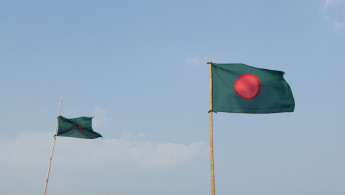Bangladesh protests US sanctions of its security chiefs
Bangladesh on Saturday called in the US ambassador to protest sanctions by Washington against its top security officers after seven people including the country's national police chief were accused by the Biden administration of human rights abuses.
Washington imposed sanctions against the Rapid Action Battalion, which is accused of involvement in hundreds of disappearances and nearly 600 extrajudicial killings since 2018.
Seven current or former officials of the Rapid Action Battalion were also sanctioned. They include Benazir Ahmed, previously the RAB chief and currently the national head of the South Asian country's more than 200,000-strong police force.
"We are determined to put human rights at the centre of our foreign policy, and we reaffirm this commitment by using appropriate tools and authorities to draw attention to and promote accountability for human rights violations and abuses," said Secretary of State Antony Blinken.
Bangladesh officials were quick to denounce the move, with foreign secretary Masud Bin Momen summoning the US ambassador "to convey Dhaka's discontent" over the decision, his ministry said.
He "regretted that the US decided to undermine an agency of the government that had been on the forefront of combating terrorism, drug trafficking and other heinous transnational crimes that were considered to be shared priorities with successive US administrations", it added in a statement.
One of the sanctioned individuals, RAB deputy chief K.M Azad, defended the force's operations, saying it never violates human rights.
"If bringing down a criminal under the law is a violation of human rights, then we have no objection to violating this human rights in the interest of the country," he said.
But local rights activists welcomed the measures.
"It is a perfect move by the US. But more officers who were involved in the abductions and enforced disappearances should have been included," said Sanjida Islam, an organiser of Mayer Daak, which represents victims' families.
Most Bangladesh security agencies are involved in enforced disappearances and extrajudicial killings, she said, but RAB was the main perpetrator and was involved in the abduction and disappearance of her brother in 2013.
RAB was created in 2004 by the then Islamist-allied government to combat extremism and serious crimes in the country of 169 million people.
But it has been dogged by controversies and accused of gross human rights violations, including staging gunfights to kill alleged criminals.
In January 2017, a Bangladesh court sentenced 26 people including 16 RAB officers to death after they were found guilty of involvement in the abduction and murder of seven people in the central city of Narayanganj.







